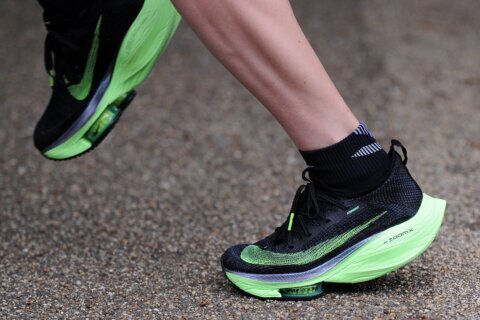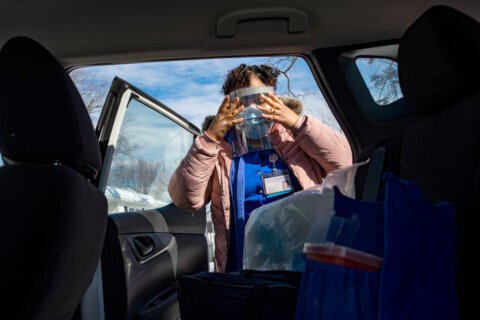Pick a weekly playlist, a safe route and get moving — that’s the key to creating a successful bike bus. It’s something that two dozen kids in Arlington, Virginia, use to get to school once a week.
Every Friday morning, Gillian Burgess leads a group of kids, including her own, to Escuela Key Elementary in Ballston.
“The point of the bike bus is that it’s safety in numbers, that’s when we have so many people biking together, it’s safer because we are easier to see,” said the mom of three and bike enthusiast.
Burgess, whose family lives car-free, acknowledged the idea of a bike bus isn’t new. In fact, she said she was jealous of one operating a few neighborhoods over when she grew up. But she has noticed that escorting the elementary-aged kids and their classmates to school on two wheels provides them an energy outlet, a sense of community and confidence.
“By putting them on a bike and letting them be the ones to literally move themselves, get themselves all the way to school,” she said. “I hope to be able to give them some more of that confidence and some more of that independence that they need to be developing during their childhood.”
Awesome bicibús this morning! Thanks to all who came out and especially to Olive Lebanese Eatery and our special bicibús fan for the delicious crepes! And our friends at @BikeArlington pic.twitter.com/pJzEfz2LUA
— Escuela Key Bicibús (nee bike train) (@BicibusKey) January 20, 2023
The Escuela Key bike bus was born out of the pandemic, when schools were trying to find alternate ways to get kids to class without packing them in a school bus.
“So, for the first probably two weeks, they really struggled. A couple of kids walked their bikes up the hill. But by about a month in, you could tell the kids were making it up the hill. And by the end of the school year, they were having no problem with it,” Burgess said.
It can come with some challenges, such as when kids have extra stuff they need to cart to class.
“My son and his friends all play trombone. And so there have definitely been some days where there’s been like five trombones in our cargo,” she said, laughing as she recalled the memory.
Safety is a concern for some parents, but Burgess said she teaches her children to assume they are invisible to drivers, so they stop whenever they see what could be a threat — including a car backing out of a driveway or an uncertain stop pattern. The group takes a trail for the majority of their commute to school, which has two pickup spots for riders to join in.
There have been some unexpected benefits from the formation of the bike bus. By simply navigating and powering their own transportation, kids who were having difficulty understanding the loss of control in their lives during the pandemic have shown improvement, Burgess said.
“When you give kids a little age-appropriate independence, they become more confident kids, they become less anxious and they realize that they actually have the power to deal with problems that come up and find solutions and move forward — which helps them have a little control over their lives, helps them just feel better, helps them be less anxious,” she said.








